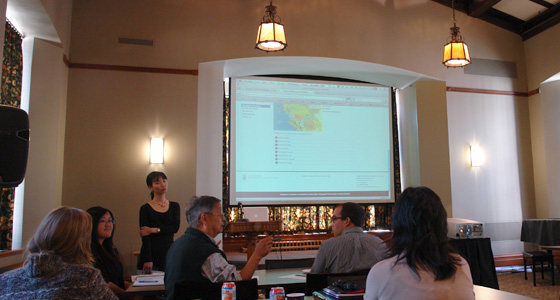 The Centre for Teaching, Learning and Technology (CTLT) is once again hosting the event series Classroom Climate: Aboriginal Initiatives, offering participants the opportunity to challenge what they have learned about Aboriginal people, and to learn how to engage in conversation about socially contentious topics. The series kicked off in October with the workshop Here: Valuing, Recognizing and Acknowledging Place. The presenters began by asking a question that bridged the themes covered throughout the session: How do you think about your relationship to place at UBC?
The Centre for Teaching, Learning and Technology (CTLT) is once again hosting the event series Classroom Climate: Aboriginal Initiatives, offering participants the opportunity to challenge what they have learned about Aboriginal people, and to learn how to engage in conversation about socially contentious topics. The series kicked off in October with the workshop Here: Valuing, Recognizing and Acknowledging Place. The presenters began by asking a question that bridged the themes covered throughout the session: How do you think about your relationship to place at UBC?
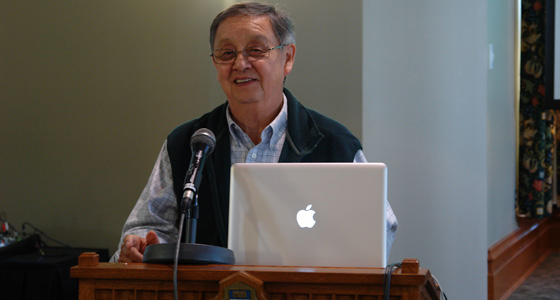 Musqueam Elder Larry Grant began by saying a welcome in Musqueam’s ancestral language, hǝn’q’ǝmin’ǝm’, as a greeting to the participants. He then continued with a discussion about the importance of teaching students the local histories of the UBC campus. “We are still here as a First Nations people. By being part of the visible First Nations, it’s slowly bringing about recognition and the fact that there should be more input by the Musqueam people to create more Aboriginal space and Aboriginal awareness,” said Larry. As the Elder in Residence at the First Nations House of Learning, Larry talked about the collaboration between Musqueam and UBC to build the First Nations Longhouse, which opened in May of 1993. Although UBC’s main Vancouver campus is located on the traditional territory of the Musqueam people, not all the carvings within the Longhouse are of Musqueam origin. Rather, it is occupied by a representation of all the different nations in the community. From the creation of the Longhouse, Larry emphasized that the importance of sharing space was a message that he hoped would transpire to the entire UBC campus. Although there is now more of a push to raise awareness about First Nations, Larry believes that “we hide sections of Canadian history so that nobody can see it. We still have a long way to go.” Speaking about the concept of space and place, Larry asserts that when he envisions himself on the land where UBC sits, he doesn’t see his place of mind at UBC, but rather in Musqueam territory.
Musqueam Elder Larry Grant began by saying a welcome in Musqueam’s ancestral language, hǝn’q’ǝmin’ǝm’, as a greeting to the participants. He then continued with a discussion about the importance of teaching students the local histories of the UBC campus. “We are still here as a First Nations people. By being part of the visible First Nations, it’s slowly bringing about recognition and the fact that there should be more input by the Musqueam people to create more Aboriginal space and Aboriginal awareness,” said Larry. As the Elder in Residence at the First Nations House of Learning, Larry talked about the collaboration between Musqueam and UBC to build the First Nations Longhouse, which opened in May of 1993. Although UBC’s main Vancouver campus is located on the traditional territory of the Musqueam people, not all the carvings within the Longhouse are of Musqueam origin. Rather, it is occupied by a representation of all the different nations in the community. From the creation of the Longhouse, Larry emphasized that the importance of sharing space was a message that he hoped would transpire to the entire UBC campus. Although there is now more of a push to raise awareness about First Nations, Larry believes that “we hide sections of Canadian history so that nobody can see it. We still have a long way to go.” Speaking about the concept of space and place, Larry asserts that when he envisions himself on the land where UBC sits, he doesn’t see his place of mind at UBC, but rather in Musqueam territory.
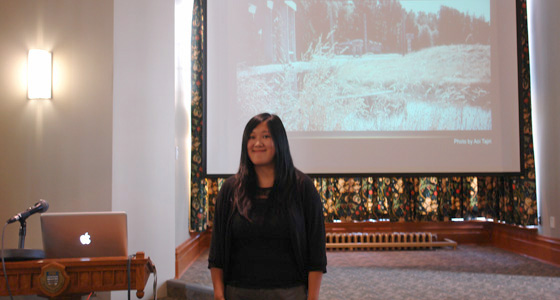 The next presenters were UBC First Nations Studies Program alumni Sarah Ling and Spencer Lindsay, who presented their project, Decolonizing Knowledge. Their on-going objective is to reconcile the misappropriation that occurs visually on campus, and to engage students in thinking about how First Nations are represented in class through experiential learning. Sarah and Spencer’s phase one pilot project was centered on the naming of two new houses at Totem Park Residence, where they sat as co-chairs of the naming advisory committee. After resolving many of the adversities they faced, and with support from Musqueam Elder Larry Grant, the pair were successful in passing the new names həm’ləsəm’ (approximate pronunciation: “hummingbird,” “legitimate,” “some”) and q’ələχən (approximate pronunciation: “cultivate,” “legitimate,” “honey”), written in the hən’q’əmin’əm’ language. The other six house names are written in English, with some being broad anthropological terms that are not even used by the nations to which they refer. During their undergraduate degrees, Sarah and Spencer came across many instances in which these names were misused by students due to a lack of understanding, and a disconnect from the First Nations peoples, cultures, and histories the names are intended to acknowledge. After experiencing frustration, fueled by the resistance they met from other members of the UBC community to using Indigenous words that “nobody would understand,” Sarah, the new CTLT Aboriginal Initiatives Graduate Academic Assistant, now feels the newest names that were chosen “honour the Musqueam Nation by increasing its presence on campus, and educating students with the richness of Musqueam history, language, and culture.”
The next presenters were UBC First Nations Studies Program alumni Sarah Ling and Spencer Lindsay, who presented their project, Decolonizing Knowledge. Their on-going objective is to reconcile the misappropriation that occurs visually on campus, and to engage students in thinking about how First Nations are represented in class through experiential learning. Sarah and Spencer’s phase one pilot project was centered on the naming of two new houses at Totem Park Residence, where they sat as co-chairs of the naming advisory committee. After resolving many of the adversities they faced, and with support from Musqueam Elder Larry Grant, the pair were successful in passing the new names həm’ləsəm’ (approximate pronunciation: “hummingbird,” “legitimate,” “some”) and q’ələχən (approximate pronunciation: “cultivate,” “legitimate,” “honey”), written in the hən’q’əmin’əm’ language. The other six house names are written in English, with some being broad anthropological terms that are not even used by the nations to which they refer. During their undergraduate degrees, Sarah and Spencer came across many instances in which these names were misused by students due to a lack of understanding, and a disconnect from the First Nations peoples, cultures, and histories the names are intended to acknowledge. After experiencing frustration, fueled by the resistance they met from other members of the UBC community to using Indigenous words that “nobody would understand,” Sarah, the new CTLT Aboriginal Initiatives Graduate Academic Assistant, now feels the newest names that were chosen “honour the Musqueam Nation by increasing its presence on campus, and educating students with the richness of Musqueam history, language, and culture.”
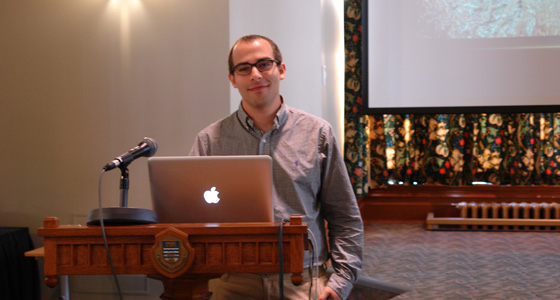 The presenters then spoke about “changing how we engage with the decontextualization of names.” Once names are decontextualized, as six of the house names were in 1964, the culture inherent to them is lost, and they simply become names without history or meaning. For Spencer, the Totem Park Residence house naming project was a way at looking at “how we work towards solutions as a society, while maintaining identity.” On the UBC Student Housing and Hospitality Services site, you can now find the history behind the names, as well as pronunciation guides and sound clips. In addition, there is a new FAQ section that addresses many of the concerns that were voiced throughout the naming process. Without the intention of sarcasm, the section answers simple questions such as “what are the English spellings for these names?” (the answer: there are no English spellings), and “why is it so important to spell these names correctly?” In keeping with the objectives of Decolonizing Knowledge, future initiatives will focus on promoting respect, fostering intercultural understanding, and preventing issues of misrepresentation, as well as cultivating new cultural sensitivity and Aboriginal awareness.
The presenters then spoke about “changing how we engage with the decontextualization of names.” Once names are decontextualized, as six of the house names were in 1964, the culture inherent to them is lost, and they simply become names without history or meaning. For Spencer, the Totem Park Residence house naming project was a way at looking at “how we work towards solutions as a society, while maintaining identity.” On the UBC Student Housing and Hospitality Services site, you can now find the history behind the names, as well as pronunciation guides and sound clips. In addition, there is a new FAQ section that addresses many of the concerns that were voiced throughout the naming process. Without the intention of sarcasm, the section answers simple questions such as “what are the English spellings for these names?” (the answer: there are no English spellings), and “why is it so important to spell these names correctly?” In keeping with the objectives of Decolonizing Knowledge, future initiatives will focus on promoting respect, fostering intercultural understanding, and preventing issues of misrepresentation, as well as cultivating new cultural sensitivity and Aboriginal awareness.
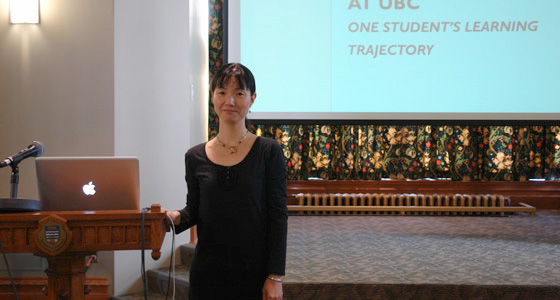 The last presenter of the session was CTLT Professional Development Coordinator, Hanae Tsukada. Beginning by explaining her personal background, Hanae introduced her timeline project that documents historical events involving Aboriginal students at UBC, along the institutional, provincial, and national historical contexts. Instead of focusing on the contents of her project, though, Hanae discussed her own journey of learning and development as she was completing the timeline. She was inspired to begin the project after attending the UBC symposium where Larry spoke about similarities and differences between the history of Japanese-Canadians and that of Aboriginal peoples. Growing up in Japan and then moving to the USA to study, Hanae came to Canada five years ago to begin her PhD program in education at UBC. “I am not outside of Canadian history,” she said despite the fact that she is not from Canada and may not stay here forever. To go against intellectual tourism, she asserted, “I have a responsibility to know where I am and the people around me.” Hanae’s project aims to develop a locally-specific contextual understanding of the issues concerning Aboriginal students at UBC, and Hanae stayed true to the theme of “place,” both in her own personal story, and the Aboriginal story that she is trying to tell.
The last presenter of the session was CTLT Professional Development Coordinator, Hanae Tsukada. Beginning by explaining her personal background, Hanae introduced her timeline project that documents historical events involving Aboriginal students at UBC, along the institutional, provincial, and national historical contexts. Instead of focusing on the contents of her project, though, Hanae discussed her own journey of learning and development as she was completing the timeline. She was inspired to begin the project after attending the UBC symposium where Larry spoke about similarities and differences between the history of Japanese-Canadians and that of Aboriginal peoples. Growing up in Japan and then moving to the USA to study, Hanae came to Canada five years ago to begin her PhD program in education at UBC. “I am not outside of Canadian history,” she said despite the fact that she is not from Canada and may not stay here forever. To go against intellectual tourism, she asserted, “I have a responsibility to know where I am and the people around me.” Hanae’s project aims to develop a locally-specific contextual understanding of the issues concerning Aboriginal students at UBC, and Hanae stayed true to the theme of “place,” both in her own personal story, and the Aboriginal story that she is trying to tell.
The session ended with a question and answer period, and after several group discussion questions throughout the presentations, there were many thoughtful questions directed at the speakers. One participant asked Larry what he thought about the two projects that were presented, specifically their efforts to take a new perspective in discussions about First Nations people. He replied, “we do not know true Canadian history. It’s very selective.” However, Larry remains optimistic that with the growing attention on recognizing and acknowledging Aboriginal land and people, and through workshop series such as Classroom Climate: Aboriginal Initiatives, the future is hopeful.

